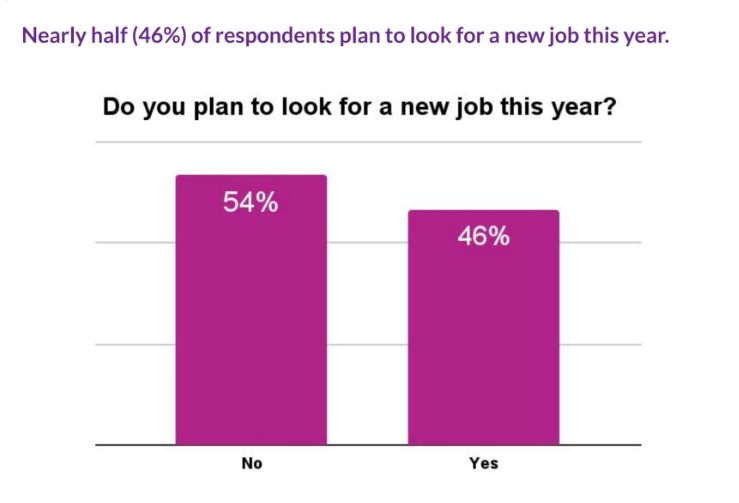
By Dean Mathews, founder and CEO of OnTheClock
Modern businesses everywhere are experiencing a talent crunch in which it’s been increasingly difficult to find and retain top talent. A recent survey found that almost half of American employees intend to look for a new job within the next year. Companies need to look inward to learn why it has become so difficult for them to hold on to their staff—a major factor driving this high turnover is poor company culture that fails to inspire loyalty and engagement in employees.
Business leaders can sometimes struggle to define their company culture, especially in large companies that have departments operating independently of one another. Corporate culture refers to the attitudes and behaviors of the people that make up the organization, and it’s present in most interactions in the workplace. The culture reflects the values that the business holds and is shown in the way processes are built.
Source: 2022 State of Staffing report
How a negative company culture can prevent businesses from attracting and retaining top talent
1. Modern employees expect businesses to build a positive culture at work
A Glassdoor survey revealed that 77% of prospective employees would consider a company’s culture before applying for or accepting a job, and 56% said that company culture is more important than salary for them. Candidates can experience a company’s culture from the minute they apply to a role. The interview process and conversations with existing employees can give them the clarity they need to accept or reject an offer. Businesses need to ensure that their employees are motivated to act as advocates for the organization when they speak to external candidates and clients.
2. Disengaged employees contribute to high absenteeism and low productivity
A negative company culture can include elements of conflict, competition, criticism, and negativity, and will mean that workers experience low levels of engagement, stress, and poor morale. Workers who find a culture to be counterproductive to their needs are more likely to do the bare minimum for the organization. Companies that fail to support and engage their employees are more likely to experience significant dips in productivity and high levels of absenteeism. 69% of employees say they would work harder if they felt appreciated at work. A positive culture can help businesses give their productivity levels a boost without hiring new employees or expanding team sizes.
3. Poor work/life balance can cost businesses talent and productivity
A company that builds a positive culture is one that looks out for its employees and considers their needs a priority. American workers are experiencing burnout at worrying rates and businesses always feel the impact in their bottom line. Overworked and burned-out employees are more often absent due to illness—and they’re more likely to seek greener pastures and look for a position where they will receive more support and appreciation.
The challenges of building a great company culture
Hybrid and remote work arrangements are increasingly popular with businesses and employees. The level of interaction each employee has with their team can vary widely depending on their location, team dynamic, work arrangement, personal culture, personality, and more. This can make it very difficult for business leaders to create a positive and consistent company culture across business silos. However, there are some tips that apply to cultural development regardless of operational styles and formats.
How to improve your company culture
1. Automate tasks to free up time
Some business leaders believe that a culture has to be built organically. While this is true to a certain extent, organizations must also put the right processes in place to help employees interact with each other in a positive way. If employees spend the majority of their time dealing with resource-intensive and tedious tasks, they are less likely to help build a company culture that supports their colleagues and their work environment.
Automation can help employees free up time and energy to focus on relationship building, process improvement, task optimization, and more. With more specialized tools becoming available for almost every business department, it has never been easier to identify and automate tasks that can be optimized.
2. Encourage innovation
Employee engagement and company culture are directly linked, and creating a fun and comfortable environment for all employees can help businesses grow a positive company culture. Therefore, business managers must allow employees to experiment with doing things in new ways. Employees perform the organization’s most important tasks and processes daily and are in the perfect position to show teams how they can be improved.
3. Get regular feedback
Once business leaders believe that they have built a strong and positive culture, they may take a more relaxed approach to further cultural development. However, as more employees join the team, team dynamics and needs can change significantly. It is crucial that business leaders create channels for open communication between employees and their managers. Managers should also make it as easy as possible for their team members to open up to them by scheduling regular check-ins and making space for new opinions and ways of doing things.
A company’s culture can give prospective hires a clear impression of how the organization will be as an employer. To become an employer of choice for modern employees, businesses must be more active in creating a culture that focuses on values that resonate with the employees they are reaching out to. As more businesses compete for an increasingly small pool of talented workers, they must offer a strong, clear, and positive company culture as a method of differentiation from other employers.
 Dean Mathews is the founder and CEO of OnTheClock, an employee time tracking app that helps over 15,000 companies all around the world track time. Dean has over 20 years of experience designing and developing business apps. He views software development as a form of art. If the artist creates a masterpiece, many people’s lives are touched and changed for the better.
Dean Mathews is the founder and CEO of OnTheClock, an employee time tracking app that helps over 15,000 companies all around the world track time. Dean has over 20 years of experience designing and developing business apps. He views software development as a form of art. If the artist creates a masterpiece, many people’s lives are touched and changed for the better.








